One of the most frequently used lines of false consolation that I hear is “you can’t change the past”. Usually this bit of indispensable wisdom is offered as a word of advice when someone is describing the impact of some negative event from their history, something that they wish had never happened and often something that continues to affect them to this day. Of course, this advice and apparent statement of the obvious is rarely helpful, which is not surprising if we look at the gist of this rejoinder.
Let’s say you run breathless to the neighbour’s house, pounding on the door. They open the door and ask what’s going on. You tell them that there’s been a terrible accident and you need them to call an ambulance because you think your brother is dead. I don’t think anyone would feel justified or even attempt to rationalize a response such as, “Well, it’s in the past. You can’t change the past. You just have to let it go and get over it.”

Hey, it’s in the past. Move on.
We would expect that person to offer help, to repair whatever damage had been done, within reason and their capability. Of course we wouldn’t expect them to take us back in time and make it unhappen. It seems that, somehow, we collectively have gotten the idea that offers to help have an expiry date. When someone is revisiting something painful from the past, they are not asking for us to undo what has been done, they are asking for help in repairing the damage. Pointing out the futility of changing the past is no more helpful years later than it would have been at the time of the incident. However, while I could talk for hours about the general uselessness of this maxim of the armchair therapist, the focus today is on whether the statement is actually true. Can we change the past? I say yes.
Now, I don’t purport to have a Delorean under a dusty sheet in my garage, or even a working knowledge of basic physics, so don’t get excited that I have discovered the secret to time travel. When I speak of changing the past, I do not speak of undoing what has been done but in changing the most vital part of what has happened: the meaning.

The meaning of this: Awesome!!
The meaning of an event is what has an impact, be it positive or negative. Events are not intrinsically meaningful. Events only have meaning as we endow it upon them. If this were not so, then every event would have the same meaning to every person. Because this is clearly not the case, we must conclude that the meaning comes from some external source. In each case, that external source is our own selves. Thus, it is not the incident from the past that must be changed, but the meaning that we have given to it. This is something we all know to be true but it is so built into our experience of reality that we have a hard time recognizing it, either as it happens or in retrospect.
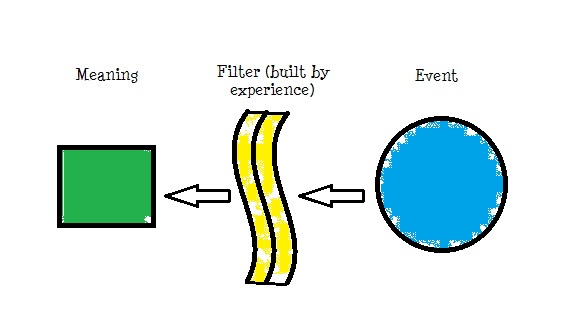
quite possibly the worst quality diagram I could come up with.
Being able to separate an event from the meaning that we have given to it is crucial in the process of overcoming the past. For example, let’s say you were sitting in a waiting room at a doctor’s office and to pass the time you decided to strike up a conversation with the patient who sitting next to you. You ask a simple question and get no answer. You then make a comment about the weather again only to be met with silence. The person is reading a magazine and appears to have a scowl on his face. It doesn’t take any great leap of imagination to interpret the situation as your fellow patient being annoyed with you and refusing to answer out of a lack of courtesy.

I hope this guy is a model and not actually this miserable.
If you have spent much of your life feeling like a burden and intrusion upon the peaceful worlds of those around you, this would be yet another experience to store in your databank and be referred to as proof of your fundamental ability to irritate others. You may refer to this instance both internally in your thoughts and externally in your complaints to others. You may remember the time when “I was so boring that somebody in the doctor’s office, a perfect stranger, could recognize that I was not worth having a conversation with.”
Now imagine, years later, you run into the same person in a doctor’s office. This time, however, he is with someone else and instead of reading a magazine with a scowl on his face, he is having an animated conversation. What is remarkable about this conversation is that it is in sign language. It is at this point that you realize that the person who ignored you all those years ago, which experience serves as such a perfect symbol of your unworthiness, is actually hearing-impaired. He was never ignoring you. He couldn’t hear you.
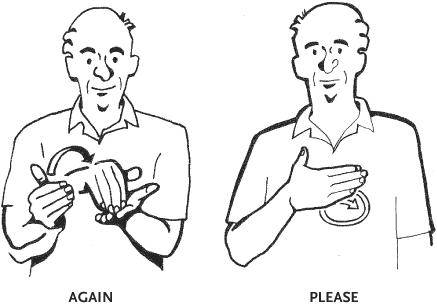
What’s the sign for “oops”?
The meaning of that pivotal moment has now changed. As a result, so must all of the conclusions and beliefs that were built on that meaning. Of course, this requires an amazing amount of energy. Because this energy expenditure is in contrast with the brain’s prerogative of short-term energy conservation, it would rather not go through the process. Therefore, it resists this re-framing of the initial event. Instead, it will attempt to twist this new information to fit in with the previous interpretation. Something like, “Well it’s a good thing he couldn’t hear me. If he could, he probably would have just pretended he couldn’t just so he wouldn’t have to talk to me.”
In addition to the energy implications of this realization, the brain is reluctant to let go of behaviors and/or beliefs that it believes increase your chances of survival. To think of yourself as unimportant and worthy of rejection may indirectly increase your chances of survival because it would prevent you from getting your hopes up and investing precious energy in the anticipation of an outcome that is not very likely. Also, if rejection is fatal, as the insecurely attached brain continues to believe that it is, then vigilance for signs of rejection is definitely a behavior that increases our chances of survival.
Having said that, despite the brain’s hardwired resistance to making this change in meaning, it is pivotal in terms of changing the way we see the world. Yes, it will require energy. It will require work. It will require concentration and persistence and dedication and assistance. But then, what goal worth attaining does not require these sacrifices?
By changing the meaning of past circumstances and events, we change the filter through which we see the world. Changing the filter maybe scary and daunting, but it may be the most truly life preserving thing we could ever do for ourselves.

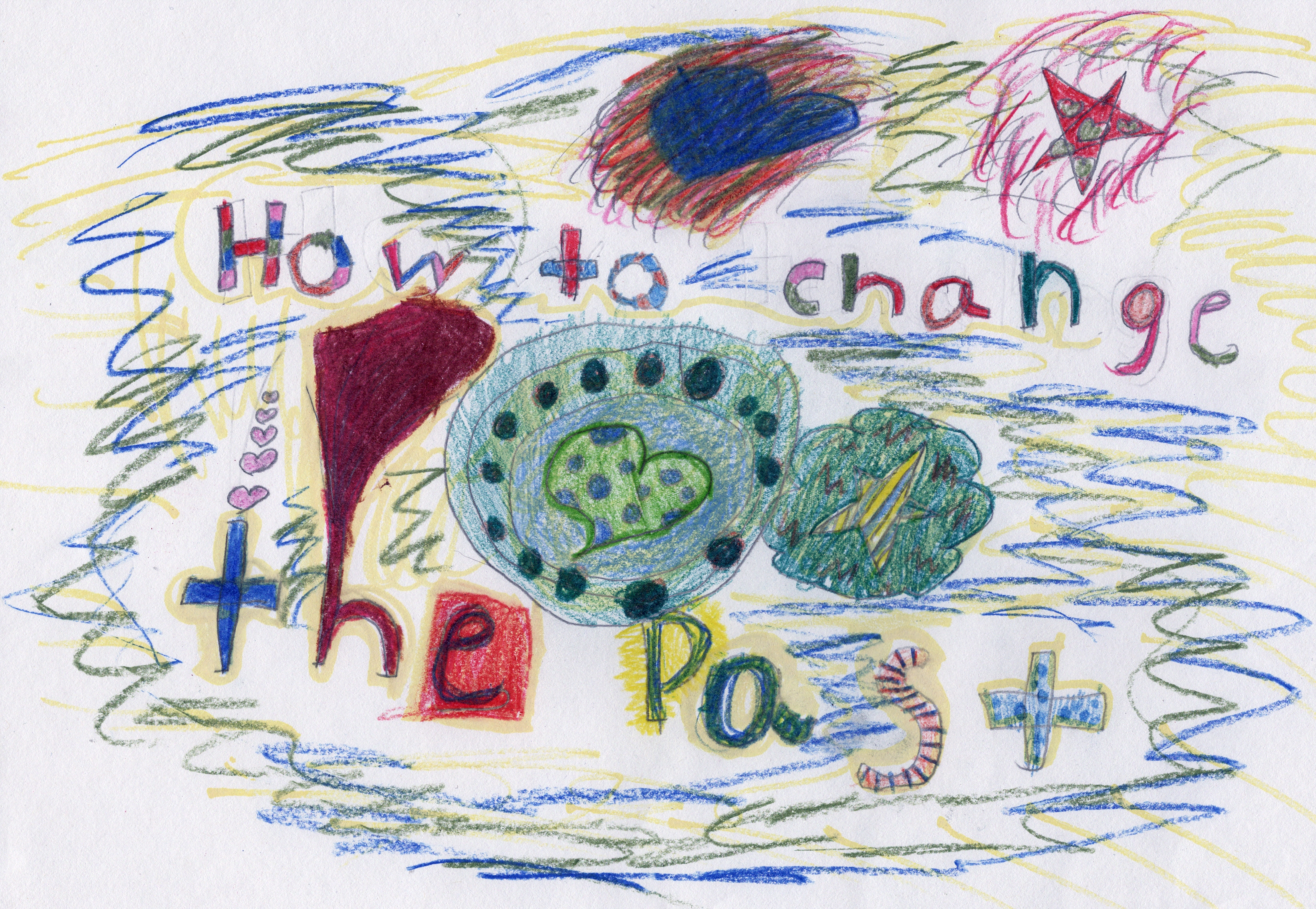















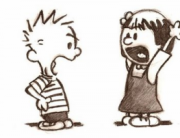





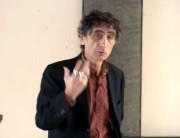


















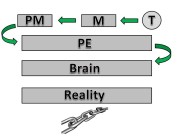





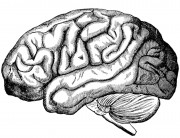



Recent Comments